

Professor Mark Priestley's blog. University of Stirling. Comment on topical issues relating to the school curriculum. How ‘twisted’ early childhood education has become — from a child development expert. Nancy Carlsson-Paige is an early childhood development expert who has been at the forefront of the debate on how best to educate — and not educate — the youngest students.
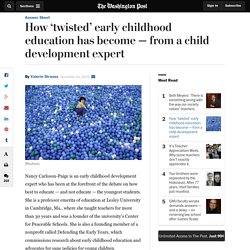
She is a professor emerita of education at Lesley University in Cambridge, Ma., where she taught teachers for more than 30 years and was a founder of the university’s Center for Peaceable Schools. She is also a founding member of a nonprofit called Defending the Early Years, which commissions research about early childhood education and advocates for sane policies for young children. Carlsson-Paige is author of “Taking Back Childhood.” The mother of two artist sons, Matt and Kyle Damon, she is also the recipient of numerous awards, including the Legacy Award from the Robert F. On the Wildness of Children — Carol Black. By Carol Black / April 2016.
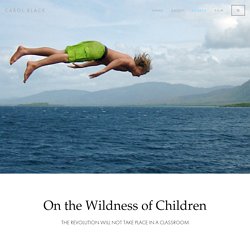
Australia's cultural heritage: parents who despise education. Hey true blue: Australia's historical dependence on physical work and a can-do capacity has bred a disdain for formal learning.
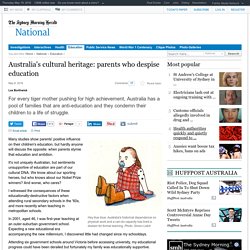
Photo: Simon Letch Many studies show parents' positive influence on their children's education, but hardly anyone will discuss the opposite: when parents stymie that education and ambition. The way you're revising may let you down in exams – and here's why. Even the most dedicated study plan can be undone by a failure to understand how human memory works.
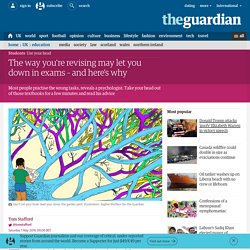
Only when you’re aware of the trap set for us by overconfidence, can you most effectively deploy the study skills you already know about. As a psychologist who studies learning and memory, I know quite a few scientifically informed revision tips: space your practice out rather than cram it all together, practise retrieving information rather than recognising it, reorganise what you’re trying to learn. Probably you’ve heard these before, maybe even from me. But even the best advice can be useless if you don’t realise why it works. Understanding one fundamental principle of human memory can help you avoid wasting time studying the wrong way. Four neuromyths that are still prevalent in schools – debunked. It is no surprise that many teachers have an interest in neuroscience and psychology since areas such as memory, motivation, curiosity, intelligence and determination are highly important in education.
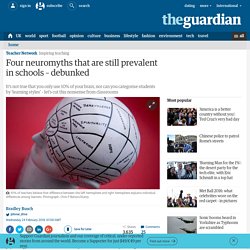
“Children need art and stories and poems and music as much as they need love and food and fresh air and play. “ Wise words from Philip Pullman, who received the Astrid Lindgren Memorial Award in 2005: Children need art and stories and poems and music as much as they need love and food and fresh air and play. If you don’t give a child food, the damage quickly becomes visible. If you don’t let a child have fresh air and play, the damage is also visible, but not so quickly. If you don’t give a child love, the damage might not be seen for some years, but it’s permanent.
Richard Feynman Creates a Simple Method for Telling Science From Pseudoscience (1966) Photo by Tamiko Thiel via Wikimedia Commons How can we know whether a claim someone makes is scientific or not?

The question is of the utmost consequence, as we are surrounded on all sides by claims that sound credible, that use the language of science—and often do so in attempts to refute scientific consensus. As we’ve seen in the case of the anti-vaccine crusade, falling victim to pseudoscientific arguments can have dire effects.
So how can ordinary people, ordinary parents, and ordinary citizens evaluate such arguments? The problem of demarcation, or what is and what is not science, has occupied philosophers for some time, and the most famous answer comes from philosopher of science Karl Popper, who proposed his theory of “falsifiability” in 1963. Physicist and science communicator Richard Feynman came up with another criterion, one that applies directly to the non-scientist likely to be bamboozled by fancy terminology that sounds scientific.
Via Big Think Related Content: When Kids Have Structure for Thinking, Better Learning Emerges. Amidst the discussions about content standards, curriculum and teaching strategies, it’s easy to lose sight of the big goals behind education, like giving students tools to deepen their quantitative and qualitative understanding of the world.
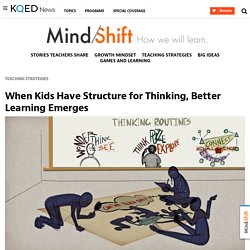
Teaching for understanding has always been a challenge, which is why Harvard’s Project Zero has been trying to figure out how great teachers do it. Some teachers discuss metacognition with students, but they often simplify the concept by describing only one of its parts — thinking about thinking. Teachers are trying to get students to slow down and take note of how and why they are thinking and to see thinking as an action they are taking. But two other core components of metacognition often get left out of these discussions — monitoring thinking and directing thinking.
When a student is reading and stops to realize he’s not really understanding the meaning behind the words, that’s monitoring. Maths and reading skills found to be 75 per cent genetic. Australian research into the academic performance of twins in NAPLAN tests has revealed that skills in maths, reading and spelling are up to 75 per cent genetic.
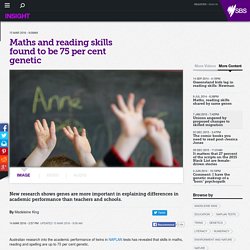
Genetics also had a 50 per cent impact on writing skills. In stark contrast, the influence of teachers and schools on students was only found to be around 5 per cent, when looking at why children performed better or worse than their peers. J Krishnamurti - To understand a child we have to watch... Small Changes in Teaching: The Last 5 Minutes of Class. I remember sitting in a movie theater with my children in December of 2003, watching the final minutes of the third film in The Lord of the Rings trilogy, and feeling a deep sense of closure as Gollum and the ring toppled into Mount Doom, and Frodo and Sam were rescued by the eagles.
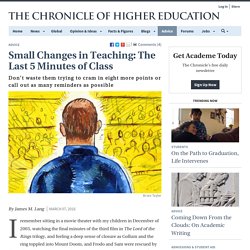
What a glorious finish to an epic film series, based on a book series that I loved as well. Only it wasn’t the finish. Once the ring melted we got to see the members of the original fellowship united again in the land of the elves. OK, I get that. Feel-good closure.